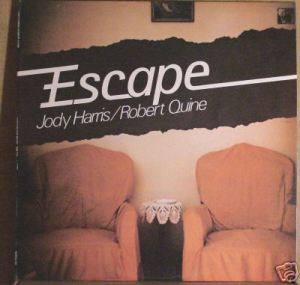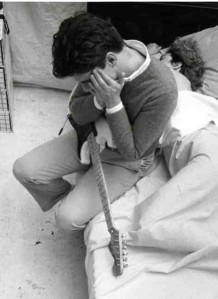Jody Harris
“The Greatest Guitar Player You’ve (Probably) Never Heard Of”
Born in 1951 in Kansas, Jody Harris took a serious interest in guitar “around the time Hendrix was around.” Early influences included Scotty Moore, James Burton, Duane Eddy, Eddie Gray (of Tommy James & the Shondells), David Cremer (Miles Davis), Johnny Guitar Watson and Bobby Womack. In a 2001 interview, Harris claimed to be “entirely self-taught except for early Mickey Baker lessons from my cousin John English, a truly great unknown guitar player. I studied jazz harmony a bit in the early 80s with a series of jazz piano books by John Mehegan – modes, scale tone chords, inversions, axis of third and seventh, figured bass notation. It’s a sensible system (figured bass was a Baroque invention specifically for improvisation) but in fact jazzboes don’t use it; it’s the session notation system in Nashville. Except for that, I can’t read music for shit.”
Harris played in a variety of Midwestern bands, including “probably the worst Top 40 band that there ever was.” This band happened to include David Hofstra (from Leavenworth, KS) on bass. After graduating college, Harris relocated to New York City in 1976, where he worked in The Strand (a book store) for his day job while trying to make a go of his music at night.
Shortly after moving to NYC, he met guitarist Robert Quine and they forged a personal and professional relationship that lasted until Quine’s death in May 2004. Early on in their friendship, Harris would hang out at Quine’s place and listen to Quine’s record collection, a vastly impressive one. “Up until then,” Harris recalled in a 1985 interview, “I played either totally ‘out,’ weird stuff or traditional R & B – Steve Cropper and James Brown-style. Quine and I got onto this thing about the Shadows, and I started learning dozens of Shadows’ songs and became fascinated with that simple, melodic approach. That was really hard for me to do, too. I was incredibly inept at it at first.”
A year after Harris arrived in New York, he was joined by bassist David Hofstra, and the two soon found themselves in the Loose Screws, a band led by Floridian Bob Musial. Don Christensen eventually joined in on drums. By the spring of 1978, Harris and Christensen were working with James Chance in the Contortions, and by the end of 1979, they had teamed up with Contortions’ bassist George Scott and guitarist/organist/saxophonist Pat Irwin to form the Raybeats.
In 1980, Harris joined Quine to record Escape, an all-instrumental album recorded on a four-track in Quine’s house. Released on Lust/Unlust Records in early 1981, the completed product consisted of five songs, each one named after a Three Stooges’ comedy short. Years later, Harris recalled the recording experience: “The album Quine and I did together actually happened because we used to sit around his house all the time and play guitars, just screwing around. So we got a deal to make a record, and we sat in his house and played guitars for six or eight months – kept throwing stuff away. He refused to allow any stuff to be planned – no charts, no real songs. We’d just play until something great happened.”
Following the dissolution of the Raybeats, Harris managed to make some noise and garner some adulation while working with The Golden Palominos, a band whose nucleus consisted of drummer Anton Fier and bassist Bill Laswell, augmented by a variety of guitarists (like Richard Thompson and Arto Lindsey) and singers (like Michael Stipe of REM, Jack Bruce of Cream and John Lydon of Public Image, Ltd.). He appeared on two of the Palominos’ albums, Visions of Excess (1985) and Blast of Silence (1986).
After leaving the Palominos, he contributed to a few other projects, including Syd Straw’s solo debut and Matthew Sweet’s Inside. Despite the respect Harris has garnered from critics, fans and his fellow musicians, he tired of the touring grind and infrequent paychecks and opted to take a job at a New York law firm in the early 1990s, only rarely doing anything publicly musical.
Quine self-admittedly kept his “friendships in music to a minimum,” yet one of these friendships that endured was the one with Harris. In a 1997 interview, Quine boasted of Harris’ musical prowess, referring to him as “tragically under-rated – he’s so far advanced, way past me and people can’t hear it. He’s paid the price for it.”
Pat Irwin concurs with Quine’s remark, “contend[ing] that he’s one of the all-time great guitar players.” And Don Christensen, who still occasionally gigs with Harris in The Band of George as well as the Contortions’ reunion tours, doesn’t stop at Harris’ prowess on guitar; he waxes poetic about his band mate’s singing chops and songwriting ability, as evidenced on Harris’ lone solo album, It Happened One Night (1982, Passport Records).
In a way, Harris has come full circle. The Band of George consists mostly of the musicians he first worked with when he came out to New York: Bob Musial, David Hofstra and Don Christensen. And now that he doesn’t have to worry about getting a paycheck from his music, he says, “One of the nicest things about the stuff I do [now] is that I don’t have to worry about money in connection with it. . . . [so I] can actually have fun for a change.”
Note: Since Jody Harris opted to not participate in this project, information for this biography was culled from the following sources:
“Jody Harris: A Trip Into the Tone Zone.” http://www.mohairsweets.mb.ca/Pages/jody_harris_pg.html
Gross, Jason. Robert Quine interview. Nov. 1997. Perfect Sound Forever online music magazine. http://www.furious.com/PERFECT/quine.html
Irwin, Pat. Personal e-mail. 19 Dec 2005.
Christensen, Don. Telephone Interviews. August-September 2005.
Forte, Dan. “The Raybeats: ‘60s Music for ‘80s People . . . And Vice Versa.” Guitar Player. Nov. 1985: 51+.
LINKS:
Interview (June 2012, Perfect Sound Forever)


